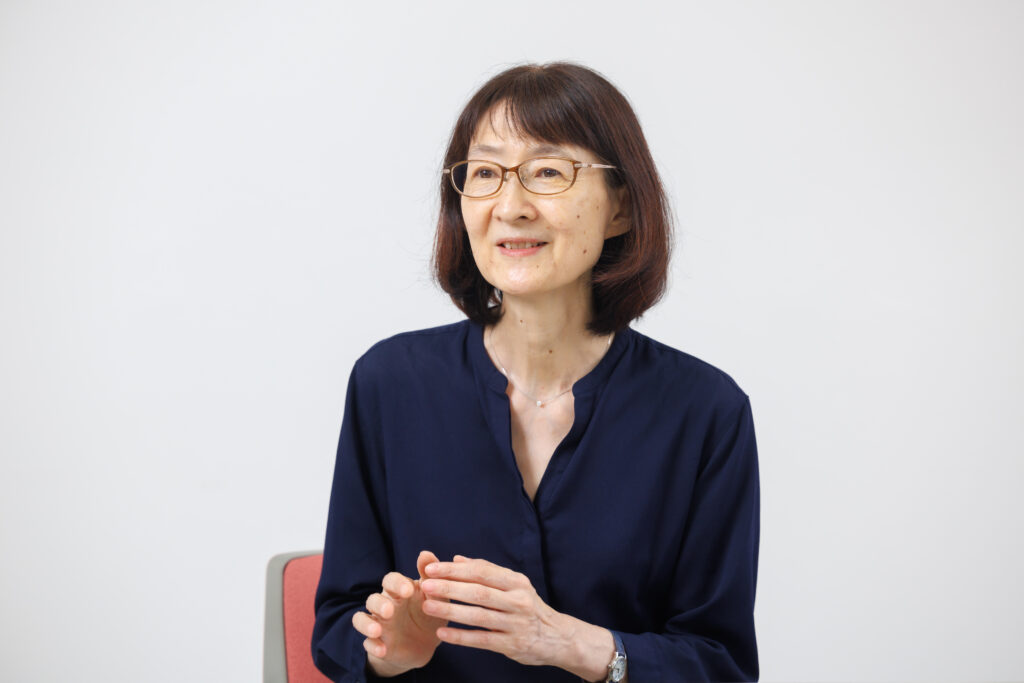
Associate Professor Ibuki Mohri of the Faculty of Human Sciences specializes in clinical psychology. As a clinical psychologist and certified public psychologist, she uses a method of psychotherapy called “cognitive behavior therapy” to confront the various mental health issues of people in the modern age, including engaging in support for people’s return to work.
In clinical psychology, an individual’s mental health issues are addressed by understanding the background and considering methods for treatment and recovery. Among the various types of psychological research, clinical psychology is one with a focus on the mental health of individuals.
I am currently engaged in supporting people who are returning to work after taking a career break due to mental health issues. According to the Ministry of Health, Labour and Welfare’s 2021 “Survey on Industrial Safety and Health (Actual Condition Survey),” 53.3% of workers experience anxiety or stress related to work, and 8.8% of companies have had workers take a leave of absence of one month or more.
Enhancing support for people’s return to work has become a key issue that needs to be resolved. Recently, more companies are actively improving their support systems for people returning to work, and there is progress in the development of programs supporting return to work. Nevertheless, when it comes to mental health, there is no one size fits all solution. This is where my specialism, cognitive behavior therapy, comes in to play.
Identifying optimal approaches by engaging in practice and examination

Cognition – the way people think and perceive things – is central to cognitive behavior therapy. As cognition differs from one person to another, importance is placed on communication and inquiry, with the goal being to help ease an individual’s anxiety by understanding their way of thinking.
One characteristic of this field is that realizations gained through practice are connected with theoretical research, hence the name clinical psychology. As a specialist in psychology, my focus is on approaches that will give the individual the tools they need to address their problems.
When it comes to return to work support, the main goal is not to get the person back into the workplace, but to help them find a way to stay in the workplace once they return. My role is to be a companion who supports the individual through the whole process as they achieve a fresh start and get back on track.
I am continuously examining how I can be of service as a specialist in psychology, including acquiring insights in clinical settings, and focusing on questions to plan research. Although cognitive behavior therapy is a relatively new area of study, it is profoundly interesting since it involves searching for optimal methods by becoming close with individuals and considering their surrounding environment.
Surveys on stress experienced by healthcare workers during COVID-19 pandemic
In addition to supporting people’s return to work, I have also been studying surveys on stress in healthcare workers due to the COVID-19 pandemic. Surveys targeting nurses showed that the satisfaction from doing a valued job was not enough to cancel out the stress from dealing with pandemic-influenced work. Although this research is still in progress, I intend to deepen my understanding of this topic in the hope of helping prepare for future crises.
Mental health is influenced by social circumstances and a multitude of external factors. As values diversify and the speed of change intensifies, people living in the modern age are exposed to different types of stress. As a specialist in clinical psychology, it is my job to provide support to help people recover, but it is also necessary to engage in extensive examination and research based on practice to improve prevention and self-care, and reduce mental health issues.
At the same time, there is a tendency for clinical psychology to focus on the people who have mental health issues. As someone involved in the education of psychology, I believe it is my responsibility to take opportunities to promote a basic understanding of mental health, spread knowledge regarding prevention, and cultivate social acceptance so that people with mental health concerns are warmly welcomed.
The book I recommend
“SF Magajin”(Science Fiction Magazine)
from Hayakawa Publishing

I first purchased this magazine when I was a junior high school student. It had many works that were difficult for me to understand at the time, so it felt as if I was overreaching myself a little bit. Nevertheless, I recall feeling excited about the fact that the magazine was expanding my world beyond my imagination.
-
Ibuki Mohri
- Associate Professor
Department of Psychology
Faculty of Human Sciences
- Associate Professor
-
Graduated from Department of Animal Husbandry, Faculty of Agriculture, Kyoto University, and received her Ph.D. in Philosophy for the Graduate School of Arts and Sciences, University of Tokyo. Has held several positions including Associate Professor, Department of Psychology, Faculty of Liberal Arts, Teikyo University, before taking up current position in 2015.
- Department of Psychology
Interviewed: September 2022